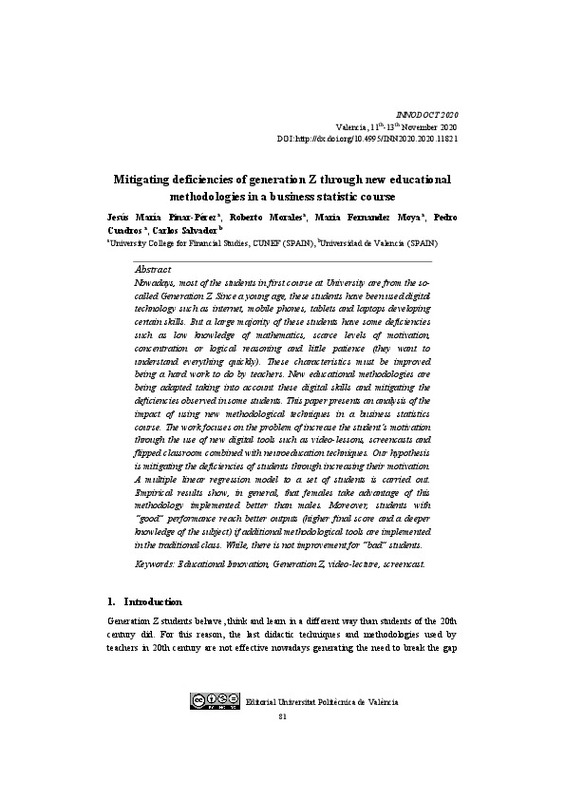JavaScript is disabled for your browser. Some features of this site may not work without it.
Buscar en RiuNet
Listar
Mi cuenta
Estadísticas
Ayuda RiuNet
Admin. UPV
Mitigating deficiencies of generation Z through new educational methodologies in a business statistic course
Mostrar el registro sencillo del ítem
Ficheros en el ítem
| dc.contributor.author | Pinar-Pérez, Jesús María
|
es_ES |
| dc.contributor.author | Morales-Arsenal, Roberto
|
es_ES |
| dc.contributor.author | Fernandez-Moya, María
|
es_ES |
| dc.contributor.author | Cuadros-Solas, Pedro
|
es_ES |
| dc.contributor.author | Salvador, Carlos
|
es_ES |
| dc.date.accessioned | 2021-02-23T09:09:38Z | |
| dc.date.available | 2021-02-23T09:09:38Z | |
| dc.date.issued | 2021-02-08 | |
| dc.identifier.isbn | 9788490488737 | |
| dc.identifier.issn | 2695-8554 | |
| dc.identifier.uri | http://hdl.handle.net/10251/162118 | |
| dc.description.abstract | [EN] Nowadays, most of the students in first course at University are from the socalled Generation Z. Since a young age, these students have been used digital technology such as internet, mobile phones, tablets and laptops developing certain skills. But a large majority of these students have some deficiencies such as low knowledge of mathematics, scarce levels of motivation, concentration or logical reasoning and little patience (they want to understand everything quickly). These characteristics must be improved being a hard work to do by teachers. New educational methodologies are being adapted taking into account these digital skills and mitigating the deficiencies observed in some students. This paper presents an analysis of the impact of using new methodological techniques in a business statistics course. The work focuses on the problem of increase the student´s motivation through the use of new digital tools such as video-lessons, screencasts and flipped classroom combined with neuroeducation techniques. Our hypothesis is mitigating the deficiencies of students through increasing their motivation. A multiple linear regression model to a set of students is carried out. Empirical results show, in general, that females take advantage of this methodology implemented better than males. Moreover, students with “good” performance reach better outputs (higher final score and a deeper knowledge of the subject) if additional methodological tools are implemented in the traditional class. While, there is not improvement for “bad” students. | es_ES |
| dc.format.extent | 8 | es_ES |
| dc.language | Inglés | es_ES |
| dc.publisher | Editorial Universitat Politècnica de València | es_ES |
| dc.relation.ispartof | Proceedings INNODOCT/20. International Conference on Innovation, Documentation and Education | es_ES |
| dc.rights | Reconocimiento - No comercial - Sin obra derivada (by-nc-nd) | es_ES |
| dc.subject | Innovation | es_ES |
| dc.subject | Teaching Technologies | es_ES |
| dc.subject | Documentation | es_ES |
| dc.subject | Educational innovation | es_ES |
| dc.subject | Generation Z | es_ES |
| dc.subject | Video-lecture | es_ES |
| dc.subject | Screencast | es_ES |
| dc.title | Mitigating deficiencies of generation Z through new educational methodologies in a business statistic course | es_ES |
| dc.type | Capítulo de libro | es_ES |
| dc.type | Comunicación en congreso | es_ES |
| dc.identifier.doi | 10.4995/INN2020.2020.11821 | |
| dc.rights.accessRights | Abierto | es_ES |
| dc.description.bibliographicCitation | Pinar-Pérez, JM.; Morales-Arsenal, R.; Fernandez-Moya, M.; Cuadros-Solas, P.; Salvador, C. (2021). Mitigating deficiencies of generation Z through new educational methodologies in a business statistic course. En Proceedings INNODOCT/20. International Conference on Innovation, Documentation and Education. Editorial Universitat Politècnica de València. 81-88. https://doi.org/10.4995/INN2020.2020.11821 | es_ES |
| dc.description.accrualMethod | OCS | es_ES |
| dc.relation.conferencename | INNODOCT 2020 | es_ES |
| dc.relation.conferencedate | Noviembre 11-16,2020 | es_ES |
| dc.relation.conferenceplace | Valencia, Spain | es_ES |
| dc.relation.publisherversion | http://ocs.editorial.upv.es/index.php/INNODOCT/INN2020/paper/view/11821 | es_ES |
| dc.description.upvformatpinicio | 81 | es_ES |
| dc.description.upvformatpfin | 88 | es_ES |
| dc.type.version | info:eu-repo/semantics/publishedVersion | es_ES |
| dc.relation.pasarela | OCS\11821 | es_ES |








